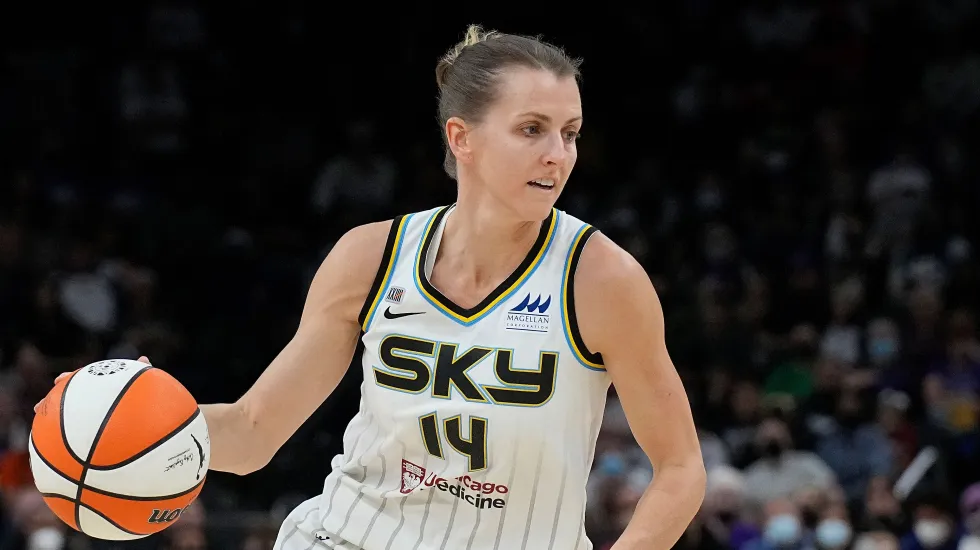
Sky guard Allie Quigley’s WNBA story is the stuff of legend.
It has been told and retold so many times that Quigley has become the example of what is possible when perseverance, hard work and opportunity meet the right timing.
She’s a member of the 2008 WNBA Draft class, along with teammate Candace Parker and former teammate Sylvia Fowles, but her road to becoming a champion looked drastically different than theirs did.
‘‘I always tell the story of Allie Quigley,’’ Sky coach/general manager James Wade said. ‘‘She’s probably tired of me telling it. It’s one of my favorite stories because I feel like Allie, except I didn’t make it. Seeing how she persevered, it’s one of my favorite stories of all time.’’
On Saturday against the Lynx in Minneapolis, Quigley returned to the court after missing the Sky’s first two games with an injury to her right knee. She scored seven points in 21 minutes in the Sky’s 82-78 victory. Emma Meesseman led five players in double figures with 17 points.
A lot of people can relate to Quigley — not only athletes whose careers took time to develop, but also normal folks who have fought through adversity.
Originally drafted by the Storm in the second round, Quigley was waived before the 2008 season started and signed with the Mercury days later. She played in 20 games in two seasons for them.
During the WNBA Finals last season, former Mercury teammate Diana Taurasi said they saw glimpses of the player Quigley would become.
In 2010 and 2011, however, Quigley played for three teams. In 2012, she decided to focus on her overseas career and skipped the WNBA season entirely.
In 2013, Quigley signed with the Sky. Then coach/GM Pokey Chatman had watched her play in Hungary and signed her, confident she belonged on the Sky’s roster.
It’s a story that holds many similarities to that of Quigley’s teammate, 31-year-old rookie Rebekah Gardner.
Wade lived hours from where Gardner was playing in Spain this offseason. But after watching her play against WNBA talent such as Arike Ogunbowale, Diamond DeShields and 2021 Finals MVP Kahleah Copper, he knew she belonged in the league.
Wade signed Gardner to a rookie-scale contract before she even arrived to camp. In her WNBA debut, Gardner proved Wade right, finishing with 14 points on 6-for-9 shooting to go with four rebounds and two steals.
‘‘It’s been 10 long years,’’ Gardner said after her debut. ‘‘So it’s nice when your hard work starts to pay off.’’
Quigley’s and Gardner’s stories reflect the need for more roster spots in the WNBA.
Wade recently released Sparkle Taylor from the replacement contract she had signed, but it wasn’t because she wasn’t talented enough to play with the Sky. The WNBA’s roster limit is 12 players, but most teams carry only 11 because of salary-cap restraints.
One of the most troubling implications is that the career arcs of players such as Quigley and Gardner aren’t commonplace.
Wade said he likes to share Quigley’s story to remind young players what’s possible if they continue developing outside the WNBA in hopes of coming back.
‘‘Everything they’re feeling now, I used to feel in my first couple of years,’’ Quigley said. ‘‘Feeling overloaded with information, like you couldn’t be your best because you’re thinking and questioning yourself. I’ve talked to the younger players about trying to stay confident, be themselves and know that it’s a process. Sometimes it’s not going to happen right away.’’







